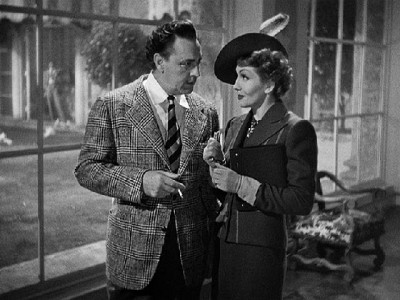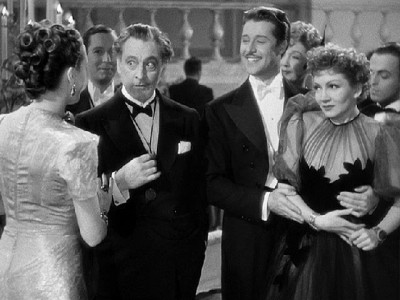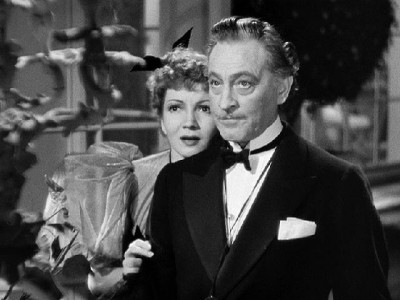
If ever there was a golden age filmmaker who has never been sufficiently appreciated, Mitchell Leisen is that man. How this happened is hard to say, but it doesn’t help that such directorial luminaries as Billy Wilder and Preston Sturges tended to run him down for not “doing right” by their screenplays. Of course, both Wilder and Sturges were desperate for the chance to direct, so anything they said must be viewed with that in mind. I wouldn’t argue that Sturges couldn’t have dealt with the physical comedy of his Easy Living (1937) better than Leisen did, but otherwise I don’t think he could have made a better film. At the same time, I think Leisen actually made a better film of the Sturges-penned Remember the Night (1940) than Sturges would have. As for Wilder, it would be years before he’d make films as charmingly sophisticated as the ones Leisen made from Wilder’s screenplays. Nowhere is this more evident than in Midnight (1939), which marks Leisen’s first encounter with a Wilder script (there would be two more).

Wilder was a worshipper of the films of Ernst Lubitsch. He had a sign in his office reading, “How would Lubitsch do it?” His second screenplay in America was for Lubitsch’s undervalued Bluebeard’s Eighth Wife (1938) and after Midnight, he would write the screenplay for Lubitsch’s somewhat overrated Ninotchka (1939). Midnight is very much in the Lubitsch mode, perhaps more so than the ones he wrote for Lubitsch. Leisen was the perfect fit for the material. He was no Lubitsch — nobody was — but he had that air of Paramount sophistication that had been largely defined by Lubitsch in the early sound era. It may have been mostly a surface sophistication, but it was there. That it was undercut by an undercurrent of an American sensibility actually made Leisen particularly well suited to the character of stranded chorus girl Eve Peabody (Claudette Colbert).

The story is pure Lubitsch. In fact, Eve is essentially a variation on Jeanette MacDonald’s impoverished runaway bride from Lubitsch’s Monte Carlo (1930). She has nothing but the clothes on her back when she finds herself very much on her own in Paris after losing everything — including her pawned baggage — in Monte Carlo. Being a pretty girl, however, she attracts the attention of Hungarian taxi driver Tibor Czerny (Don Amerche, whose pleasantness makes up for his improbable nationality). In fact, he may be a little too interested, so, using a pawn ticket for an invitation, she ducks into a ritzy party. The fact that she’s in a gold lamé evening gown helps. There she passes herself off as Madame Czerny and is then promoted to Baroness Czerny by Baron Flammarion (John Barrymore), who sees in this imposter a possible way to lure away his wife’s (Mary Astor) newest boyfriend (Francis Lederer). Thereby hangs the plot. Yes, it’s silly, but it’s deliciously so and blessed with witty dialogue and clever complications.

This is a kind of sophisticated comedy romance little seen these days — the last close approximation I can think of is Miss Pettigrew Lives for a Day from 2008 and it was something of an anomaly — and, for me, at least, much missed. Fortunately, of course, the best of them are still around and perhaps gleam with even greater brilliance today thanks to their scarcity. Midnight is certainly one such film — one of the very best. Plus, it has the advantage of affording the great John Barrymore one of his few really good late period roles — ironically cast as the husband of real-life ex-girlfriend Mary Astor. The signs of dissipation are clearly showing, but he’s still Barrymore and he proves once more that he could steal any scene he wanted.
The Asheville Film Society will screen Midnight Tuesday, Feb. 4, at 8 p.m. in Theater Six at The Carolina Asheville and will be hosted by Xpress movie critics Ken Hanke and Justin Souther.




Before you comment
The comments section is here to provide a platform for civil dialogue on the issues we face together as a local community. Xpress is committed to offering this platform for all voices, but when the tone of the discussion gets nasty or strays off topic, we believe many people choose not to participate. Xpress editors are determined to moderate comments to ensure a constructive interchange is maintained. All comments judged not to be in keeping with the spirit of civil discourse will be removed and repeat violators will be banned. See here for our terms of service. Thank you for being part of this effort to promote respectful discussion.